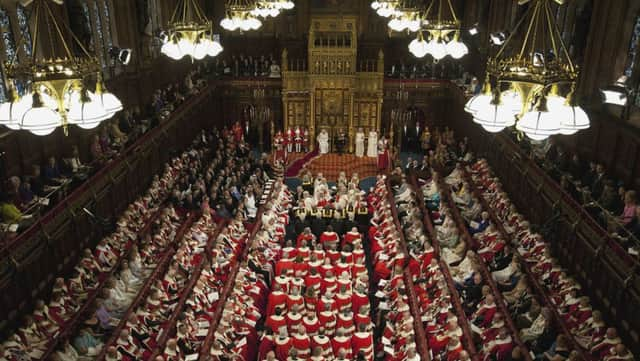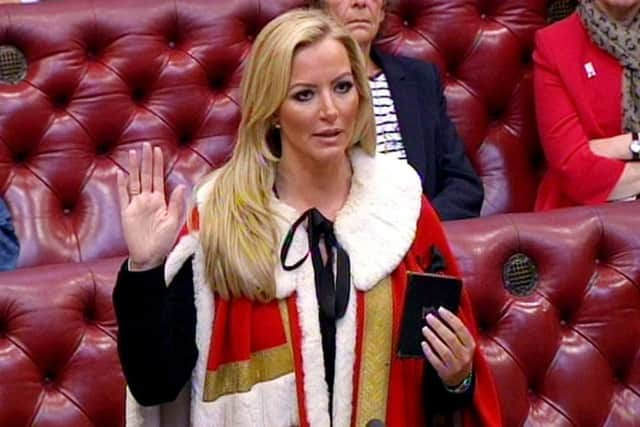A peer into what role Scots play in the House of Lords


For hundreds of years the House of Lords has courted criticism and controversy, most recently accused of “constitutional outrage” after voting against a Commons decision to cut tax credits.
It was a decision that illuminated the full power of the second chamber whose function is all too often misted in privilege, pageantry and deep scepticism of the house which is still wholly unelected by the public.
Advertisement
Hide AdAdvertisement
Hide AdSo who are the peers of Scotland who have taken their seats on the famous red benches?


A look through the most recent list of expenses claimed by members of the House of Lords shows there are 61 peers who are registered to live in Scotland.
This represents around eight per cent of the 760 eligible members of the House of Lords but does not include a number of others who have significant Scottish interests.
For example, some who have claim to ancient Scottish land titles but live in England are not included in the list.
Meanwhile, the 61 peers of Scotland do not include Baroness Mone, the lingerie tycoon, who left Glasgow for London following the referendum and who declined the offer of a territorial designation linked to her country of birth.
While she is officially just known as Baroness Mone, her “peerage postmark” is, with her agreement, Mayfair.
By contrast, a high number of non-hereditary peers have chosen a Scottish title to reflect their roots, despite their life and professional achievements having been largely forged outwith Scotland. Lord Lamont of Lerwick, the former Conservative chancellor, is one.
WHO ARE THE 61?
Hereditary peers – of the peers listed as living in Scotland, 12 of them are elected hereditary peers.
Advertisement
Hide AdAdvertisement
Hide AdAfter reforms led by ‘Lords abolitionist’ Tony Blair in 1999, the number of hereditary peers admitted into the House was limited to 92.
They no longer automatically get a seat on the red benches due to their birth line and are elected by political groupings of other hereditary peers, including crossbenchers.
High ranking judicial figures –there are five former Lord Advocates serving on the red benches.
Colin Boyd, now Lord Boyd of Duncansby, was made a crossbench peer by Downing Street in 2006 while he was still Scotland’s top prosecutor.
Concerns were raised over politicising the role and Boyd – who had been nominated by former first minister Jack McConnell – announced his resignation as Lord Advocate and took the Labour whip.
Other former Lord Advocates on the red benches include 88-year-old Lord Mackay of Clashfern. The record of the former Lord High Commissioner of the General Assembly of Scotland – and strict Sabbatarian – suggests he is still very much active. In March he attended the House of Lords nine days out of a possible 17.
LIFE PEERS
There are more than 40 life peers from Scotland now sitting in the House of Lords, drawn from a range of political and professional interests.
Most recent additions include former Liberal Democrat leader Menzies Campbell his party colleague Sir Malcolm Bruce and former Labour chancellor Alistair Darling. He will become the 19th Labour peer from Scotland, with the party having the highest proportion of Scottish life peers.
HOW MUCH DO THEY COST?
Advertisement
Hide AdAdvertisement
Hide AdAccording to the latest House of Lords Annual Report, net operating costs for the chamber totalled £94.4 million for 2014-15. Of this, £20.7m was spent on members’ allowances and expenses.
There are ongoing claims that peers are claiming hundreds of pounds a day simply by walking to the House of Lords and “signing in” to claim their daily allowance of £300.
THE VIEW OF A PEER
Menzies Campbell, former Liberal Democrat leader and now Lord Campbell of Pittenweem, is one of the newest members of the second chambers.
He agreed further reform was necessary.
The peer, who was sworn in just last week, said: “My own view remains that it requires to be reformed and it requires to be mainly elected to 80 per cent but with provision for those who might bring specialist knowledge to its deliberations to make up the remainder.
“But it would be a very different place. It is hard to see how its courtesy would survive accountability and adversarial politics.”